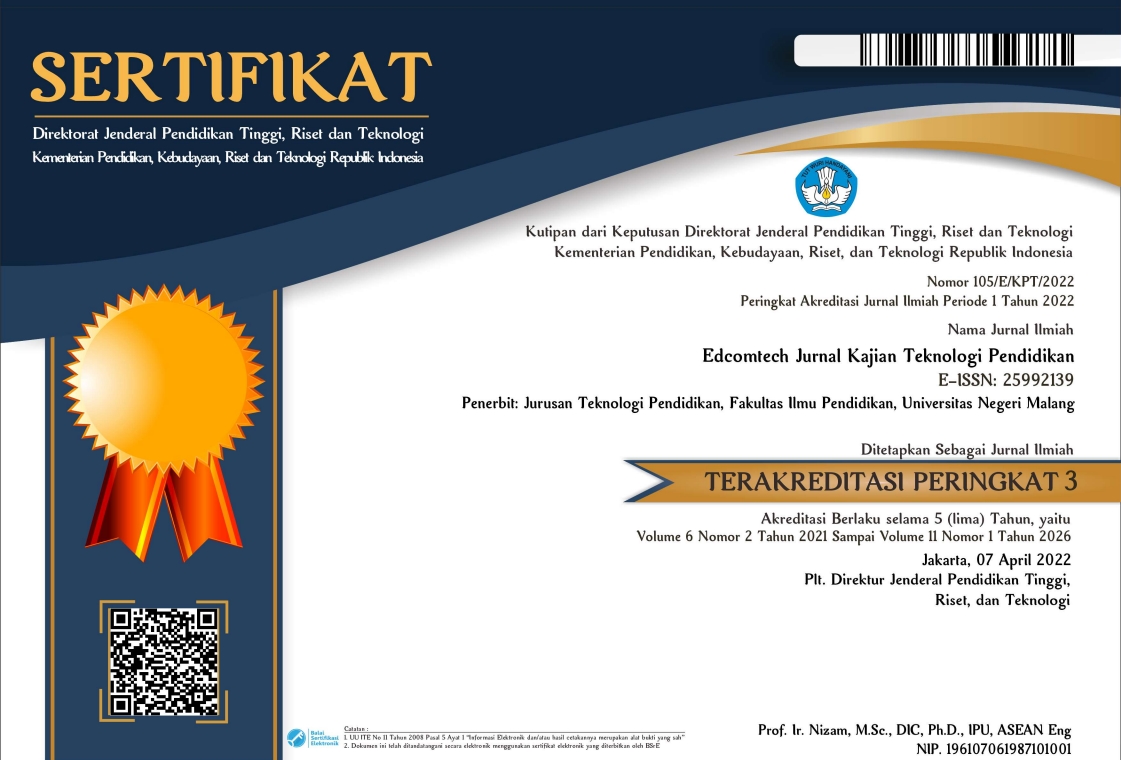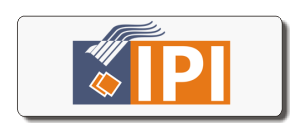Indonesian Undergraduate EFL Students’ Perceptions toward Flipped Classroom
Abstract
Abstract: The aim of this study was to find Indonesian undergraduate EFL students’ perceptions towards the implementation of flipped classroom. This study implemented survey research design and perceptions were found out through questionnaire and the questionnaires were spread to 30 students who experienced the implementation of flipped classroom. The questionnaire consisted of two aspects, namely meaningful and competence aspects. The results of questionnaire of perceptions were statistically calculated. The data on meaningful aspect revealed that mostly the students had positive perceptions toward the implementation of flipped classroom. On the other hand, in competence aspect, the students perceived that flipped classroom was beneficial for their writing competence. However, for the pre-class activities, such as viewing video and reading e-materials, the students had varied perceptions on it. They actually like the idea to have an additional video-lecture and e-material to prepare them before the class, but they did not really see the meaning by doing that pre-class activities.
Tujuan dari penelitian ini adalah untuk menemukan persepsi mahasiswa EFL Indonesia terhadap penerapan flipped classroom. Penelitian ini menggunakan desain survey dan data dikumpulkan melalui kuesioner dan disebarkan kepada 30 siswa yang mengalami implementasi flipped classroom. Kuesioner terdiri dari dua aspek, yaitu aspek kebermaknaan dan kompetensi. Hasil kuesioner dihitung secara statistik. Data pada aspek kebermaknaan mengungkapkan bahwa sebagian besar siswa memiliki persepsi positif terhadap pelaksanaan flipped classroom. Di sisi lain, dalam aspek kompetensi, siswa merasa bahwa flipped classroom bermanfaat untuk kompetensi menulis mereka. Namun, untuk kegiatan pra-kelas, seperti menonton video dan membaca materi daring, siswa memiliki berbagai persepsi di dalamnya. Mereka menyukai ide untuk meononton video pengajaran dan materi daring tambahan untuk mempersiapkan mereka sebelum kelas, tetapi mereka tidak benar-benar melihat arti pada pelaksanaan kegiatan pra-kelas tersebut.
Keywords
Full Text:
PDFReferences
Afrilyasanti, R., Cahyono, B. Y., & Astuti, U. P. (2016). Effect of Flipped Classroom Model on Indonesian EFL Students’ Writing Ability across and Individual Differences in Learning. International Journal of English Language and Linguistics Research, 4(5), 65-81.
Afrilyasanti, R., Cahyono, B. Y., & Astuti, U. P. (2017). Indonesian EFL Students’ Perceptions on the Implementation of Flipped Classroom Model. Journal of Language Teaching and Research, 8(3), 476-484. doi: 10.17507/jltr.0803.05
Ahmed, M. A. E. A. S. (2016). The Effect of a Flipping Classroom on Writing Skill in English as a Foreign Language and Students’ Attitude towards Flipping. US-China Foreign Language, 14(2), 98-114. doi: http://dx.doi.org/10.17265/1539-8080/2016.02.003
Arnold -Garza, S. (2014). The Flipped Classroom Teaching Model and its Use for Information Literacy Instruction. Communications in Information Literacy, 8(1), 7-22. doi: http://dx.doi.org/10.15760/comminfolit.2014.8.1.161
Bishop, J. L., & Verleger, M. A. (2013). The Flipped Classroom: A Survey of the Research. In Proceedings of 120th ASEE Annual Conference and Exposition. Atlanta, GA (Vol. 30, No. 9, pp. 1-18).
Efron, R. (1969) What is Perception?. In: Cohen R.S., Wartofsky M.W. (Eds.) Proceedings of the Boston Colloquium for the Philosophy of Science 1966/1968. Boston Studies in the Philosophy of Science, vol 4. (pp. 137-173). Dordrecht: Springer.
Gagnon, P., Mendoza, R., & Carlstedt-Duke, J., (2017). A Technology-Enabled Flipped Classroom Model. In C. Reidsema, L. Kavanagh, R. Hadgraft & N. Smith (Eds.), The Flipped Classroom: Practice and Practices in Higher Education (pp. 211-228). Singapore: Springer Nature.
Herreid, C. F., & Schiller, N. A. (2013). Case Studied and the Flipped Classroom. Journal of College Science Teaching, 42(5), 62-66.
Hsieh, B. (2017). Step by Step, Slowly I Flip. In L. S. Green, J. R. Banas, & R. A. Perkins (Eds.), The Flipped College Classroom: Conceptualized and Re-Conceptualized (pp. 11-36). Switzerland: Springer International Publishing.
Lafee, S. (2013). Flipped Learning. Education Digest, 79(3), 13-18.
Long, T., Logan, J., & Waugh, M. (2016). Students’ Perceptions of the Value of Using Videos as a Pre-class Learning Experience in the Flipped Classroom. TechTrends, 60(3), 245-252. doi: https://doi.org/10.1007/s11528-016-0045-4
Reidsema, C., Hadgraft, R., & Kavanagh, L. (2017). Introduction to the Flipped Classroom. In C. Reidsema, L. Kavanagh, R. Hadgraft & N. Smith (Eds.), The Flipped Classroom: Practice and Practices in Higher Education (pp. 3-14). Singapore: Springer Nature.
Rookes, P., & Wilson, J. (2005). Perception: theory, development, and organisation. Philadelphia: Taylor & Francis e-Library.
Weber, K., Martin, M. M., & Cayanus, J. L. (2005), Student interest: A two-study re-examination of the concept. Communication Quarterly, 53(01), 71-86. doi: https://doi.org/10.1080/01463370500055996
Yujing, N. (2015). Influence of Flipped Classroom on Learner's Empowerment-A Study Based on English Writing Courses in China. Journal of Literature, Languages and Linguistics, 12(1), 1-7.
Zainuddin, Z., & Attaran, M. (2016). Malaysian students’ perceptions of flipped classroom: a case study. Innovations in Education and Teaching International, 53(6), 660–670. doi: 10.1080/14703297.2015.1102079
DOI: http://dx.doi.org/10.17977/um039v5i12020p001
Refbacks
- There are currently no refbacks.
Copyright (c) 2020 Amanda Vira Maharani, Hamamah Hamamah, Ika Nurhayani

This work is licensed under a Creative Commons Attribution-ShareAlike 4.0 International License.
Edcomtech: Jurnal Kajian Teknologi Pendidikan published by Department of Educational Technology, Faculty of Education, State University of Malang in Collaboration with Asosiasi Program Studi Teknologi Pendidikan Indonesia (APS TPI) and Ikatan Profesi Teknologi Pendidikan Indonesia (IPTPI) with MoU.
Publisher Address:
Lab. Teknologi Pendidikan, Gd.E2, Lt.1
Fakultas Ilmu Pendidikan Universitas Negeri Malang
Jalan Semarang No 5, Kota Malang Kode Pos 65145
Email: edcomtech.fip@um.ac.id
========================================================================================================
| INDEXED BY | TOOLS | PLAGIARISM CHECK | ARTICLE TEMPLATE |
|

Edcomtech is licensed under a Creative Commons Attribution-ShareAlike 4.0 International License.
Edcomtech Statistics (Since July 13th, 2020)











1.png)








